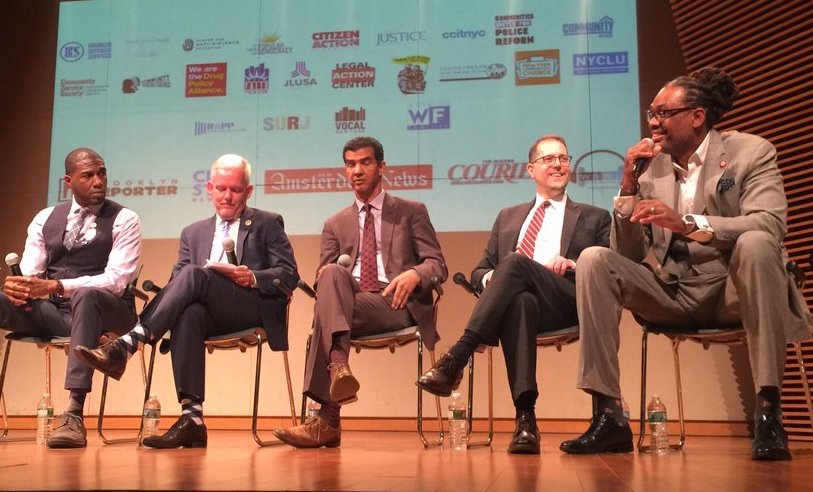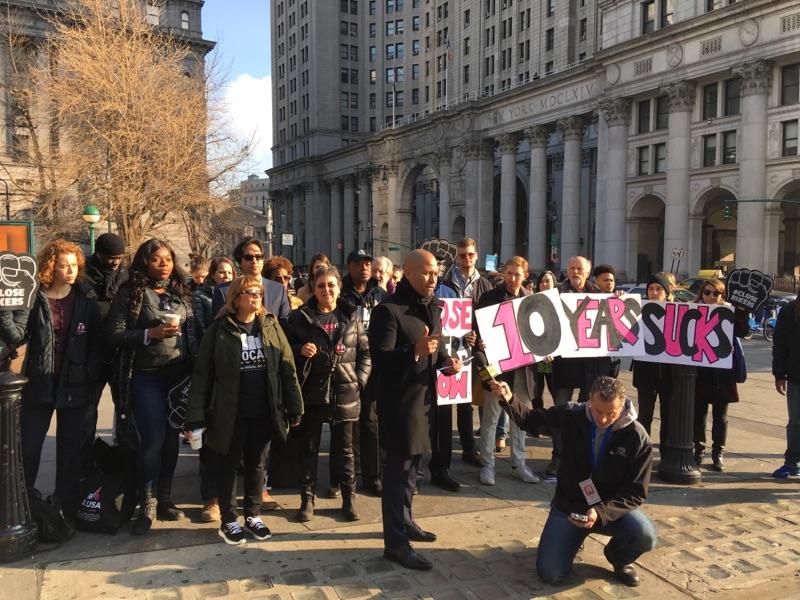The City’s Bogus Compromise with Uber Would Hurt Riders with Disabilities

(photo via nyc.gov)
The hustle and bustle of New York is a part of its identity: we New Yorkers are always on the move. Our officials must fight for equal access to transportation, but as those of us with disabilities know, accessible methods of travel are shamefully limited. This is why the Taxi and Limousine Commission (TLC) has apparently been negotiating with private for-hire car companies like Uber and Lyft on the issue of wheelchair accessible taxis for several months.
This could have been an encouraging sign, but last week, it became clear that TLC is more interested in cutting a backroom deal with Uber and Lyft than it is with seriously listening to wheelchair users. The TLC has even gone so far as to ignore sensible calls for action in favor of a proposal initiated by the very same companies who created this crisis.
It has been clear that the city’s yellow taxi accessibility program is on the ropes – mainly because accessible taxis cost much more to operate and maintain than regular taxis. The TLC created the Taxi Improvement Fund (TIF), which takes 30 cents from each yellow cab ride to support drivers with accessible vehicles. But it has become increasingly clear to disabled riders that the current TIF program is not enough. Drivers are struggling to make ends meet, and the program is in danger of complete collapse.
That is why I have called upon the TLC to mandate that ride-hail companies, including multi-billion dollar giants like Uber and Lyft, contribute to the TIF. Since these companies have proven to less than friendly to disabled riders, they should have to pay a higher fee.
This plan is simple and effective. The TIF is a city fund overseen by the city, rather than a state tax, so this tweak wouldn’t require any changes to state law or any approval from state officials. (For some reason, the TLC recently tried to convince me that it would require state approval, but that is just not true.) Not only is it easy to implement, but this proposal would provide critical support for the drivers who need it most and help wheelchair users navigate the city.
It is a win for all stakeholders. Elected officials get an easy fix to a critical problem, cab drivers already doing the right thing get support they need, and New Yorkers with disabilities get greater transportation access.
Not so fast, though.
The TLC is considering a proposal – one that originated with Uber, Lyft and other for-hire vehicle providers themselves – that would create a two-year pilot program allowing companies who opt in “to provide accessible service via a central dispatch system.”
The currently-negotiated plan is that companies would provide accessible vehicles to riders who request them in under 15 minutes, 60 percent of the time in the first year and 80 percent in the second.
I know that this proposal will not result in any meaningfully positive changes for wheelchair users like myself.
Despite from the fact that these companies have a track record of promoting falsehoods when it comes to accessibility and have frequently avoided actually putting accessible vehicles on the road, there is nothing in this proposal to hold them accountable.
In fact, it looks like this so-called pilot program would amount to little more than words.
This potential compromise also does nothing to solve the TIF crisis and would likely lead to the end of the city’s accessible taxi program. This outcome would leave the many riders who depend on wheelchair-accessible vehicles in the hands of private companies, who, at the very best, would only promise to provide a car within 15 minutes 60 percent of the time.
In a city with a terrible track record on wheelchair accessibility – have a look around any subway station – ceding this ground is an unacceptable outcome that will leave New Yorkers with disabilities without a reliable method of transportation.
That is an outrage. Fortunately, a sensible solution is out there – but it is up to the TLC to do the right thing, and the time is now.
***
Dustin Jones is president and founder of United for Equal Access New York, a disability advocacy group.
***
Have an op-ed idea or submission for Gotham Gazette? Email This email address is being protected from spambots. You need JavaScript enabled to view it.
High Stakes for Affordable Housing in City Council Speaker Race

Robert Cornegy (far right) at a City Council Speaker forum (photo: @RobertCornegyJr)
Eight members of the New York City Council are asking their colleagues to elect them as the new Speaker after the new legislative body is seated January 1.
Seven of the candidates oppose allowing Airbnb and other on-line platforms to continue their assault on our scarce affordable rental housing. But one of them, Robert Cornegy, Jr. of Brooklyn, does not.
In a June 2016 opinion piece for City & State, Council Member Cornegy argued that Airbnb brings extra income to his struggling constituents in Crown Heights and Bedford-Stuyvesant, ensuring that they can continue to live in the rapidly gentrifying neighborhoods. This column was straight out of the Airbnb playbook, and contradicted by the fact that roughly 75 percent of Airbnb revenue in New York City is generated by commercial hosts with multiple listings, not “regular folks” renting their own place.
North and Central Brooklyn are the epicenter of gentrification in New York City, and Airbnb has played a destructive role. In Council Member Cornegy’s district, there were some 3,400 listings for Airbnb in October. Of these, almost 1,300 were for entire homes. If these “entire homes” are in apartment buildings, then they are illegal, as short-term rentals are against the law if the tenant is not present. (Renting out a room while the tenant is living in the apartment is not illegal, although tenants who do so risk eviction if the landlord finds out.)
Airbnb’s negative impact on Council Member Cornegy’s district is merely one part of a larger trend in the borough. Four City Council districts stretching from Williamsburg to Crown Heights are represented by Steve Levin, Antonio Reynoso, Laurie Cumbo, and Cornegy. These four districts combined had Airbnb listings for more than 16,000 units in October. By contrast, the top four Council districts in Manhattan combined had 10,800 listings.
A study last March by Inside Airbnb tallied the host photographs in the 72 predominately African-American neighborhoods in the city. The Airbnb host population in these communities was 74 percent white, while the white resident population was only 13.9 percent. White hosts in these neighborhoods earned 73.7 percent of the income from Airbnb rentals. Despite Airbnb’s claim that they make it possible for people of color to supplement their incomes, it is clear that the newer, white residents in these gentrifying neighborhoods are the main beneficiaries of the “sharing economy.”
So, who suffers? These units have been withdrawn from the rental market because short-term rentals are more profitable. Long-term residents therefore face a tighter market, and are subject to harassment and rent gouging.
This is not only a Brooklyn or even a New York problem. From Vancouver to London, local governments are taking action to curb short-term rentals. Airbnb’s response is to stonewall, and enlist surrogates to spin its public relations web.
I have a friend whose family owns a restaurant in a year-round resort town in the northeastern United States. He told me recently that until a couple of years ago, the cooks and waiters could share a house for $700 to $800 per month. Now there are no such rentals available, because owners can make that much in a weekend through Airbnb.
The sheer scope of this crisis makes the future of New York City’s government all the more critical. The rest of the nation and even the world look to us as a model for policy and politics, and we must do everything we can to make our housing market more affordable.
Ensuring that the next Speaker of the City Council is a true advocate for tenants, and for preserving our threatened stock of affordable rental housing, is the first next step in addressing the host of problems we face: weakened rent laws, lax enforcement by state and city, predatory speculators paying excessive prices for apartment buildings with an eye to driving out the rent-regulated tenants, constant upward pressure on rents, construction as harassment, and more.
We cannot afford to have in our house of government a Speaker who will not fight to protect the homes of its citizens. I urge Council Member Cornegy’s colleagues to take a look at this before casting their votes, and show that they stand with tenants, not the companies that are forcing them out.
***
Michael McKee is treasurer of Tenants Political Action Committee. On Twitter @TenantsPACNY.
***
Have an op-ed idea or submission for Gotham Gazette? Email This email address is being protected from spambots. You need JavaScript enabled to view it.
De Blasio Administration Disappoints at Rikers Hearing

Glenn Martin & JustLeadershipUSA (photo: @GlennEMartin)
New Yorkers depend on City Council hearings to hold agencies accountable and to demand transparency from the mayor’s administration. On Monday, what the City Council members of the Fire and Criminal Justice Committee got instead was a dismissive attitude cushioned in lofty rhetoric from a mayor’s office that seems unwilling or unable to make closing the jails on Rikers Island a priority.
Time after time, representatives from Mayor Bill de Blasio’s Office of Criminal Justice (MOCJ) and the city Department of Correction (DOC) sidestepped important questions, reaffirmed their adherence to a too-long ten-year timeline to closing Rikers jails, and adamantly refused to offer a concrete plan for how to achieve even that goal.
Several Council members were quick to point out that a ten-year timeline is not justified by any information that has been presented to them, but the de Blasio administration made clear that they see the challenge of closing Rikers jails as a “steep climb,” and something that will be nearly impossible to achieve in anything less than ten years.
Glenn E. Martin, president of JustLeadershipUSA and founder of the #CLOSErikers campaign, voiced a concern that many were palpably feeling during the hearing when, in his testimony, he described Mayor de Blasio’s actions on closing Rikers as “opaque, narrow, and visionless.” Martin and others voiced concerns over some of MOCJ’s proposals, including the use of risk assessments in evaluating the population at Rikers Island, as well as the language used by new DOC Commissioner Cynthia Brann, who constantly referred to people incarcerated on Rikers as “inmates.”
On Twitter, Martin noted that Brann’s call for cultural change at Rikers – what he sees as an untenable given the deeply-entrenched culture of brutality on the island – was rendered meaningless by her refusal to “recognize the humanity of the people there.”
There were other moments in testimony from MOCJ and DOC offering insight into how the mayor is approaching the problems presented by Rikers Island.
MOCJ Director Liz Glazer reaffirmed her office’s commitment to using data to help reduce the number of people incarcerated at Rikers, while pointing out that the seriousness of the charges that many are facing may make it difficult to immediately relocate or release several of those people. Additionally, DOC Commissioner Brann highlighted some of the increased programming that has been introduced at Rikers, and walked Council members through some of the recent reforms that are a result of oversight efforts from the court-appointed Nunez Monitoring Team.
However, even with these moments, the hearing felt like a missed opportunity to communicate the mayor’s vision, if he has one, to a city eager for concrete action and meaningful change. “While today's hearing should have been an opportunity to engage with the administration and learn about what they have done and intend to do, the hearing showed that the mayor is simply not interested in crafting meaningful and bold solutions in the effort to close Rikers,” said Martin.
What was perhaps most shocking, however, was not just how little was said about what’s next, but how little was said about whatever has been achieved up to this point. The City Council was given very little substantive information to work with, and was instead forced to reckon with the fact that, in many ways, the mayoral administration’s work on closing Rikers still sits at square one. In fact, judging by the few proposals and initiatives that were discussed by the administration, it would appear that they still do not understand the scope or the urgency of this issue.
Much of the testimony offered from the mayor’s representatives felt like it could have been spoken, without changing a word, several years ago. This is despite what the mayor claims has been significant progress on criminal justice reform throughout the second half of his first term. Time and again, MOCJ and DOC testimonies were centered on platitudes about the challenges that remain and the general vision that the mayor reluctantly adopted when he did finally agree that the city should work to close the Rikers jail complex.
But that was pretty much all they offered, and that’s the problem.
Rikers Island continues to be a destructive force for New York’s communities, budget, and conscience. It is, as Comptroller Scott Stringer has said, a stain on the moral fabric of our city. For this administration to offer little more than empty words and half-hearted ideas is a true disappointment for all of the New Yorkers eager to work with this mayor to end the trauma that results from this national embarrassment. Perhaps most importantly of all, this administration’s attitude was a deeply painful insult to the people who’ve been directly harmed by Rikers, many of whom were in the audience, looking on as the mayor’s representatives seemed to look past them.
***
Shanequa Charles is a #CLOSErikers campaign member.
***
Have an op-ed idea or submission for Gotham Gazette? Email This email address is being protected from spambots. You need JavaScript enabled to view it.




